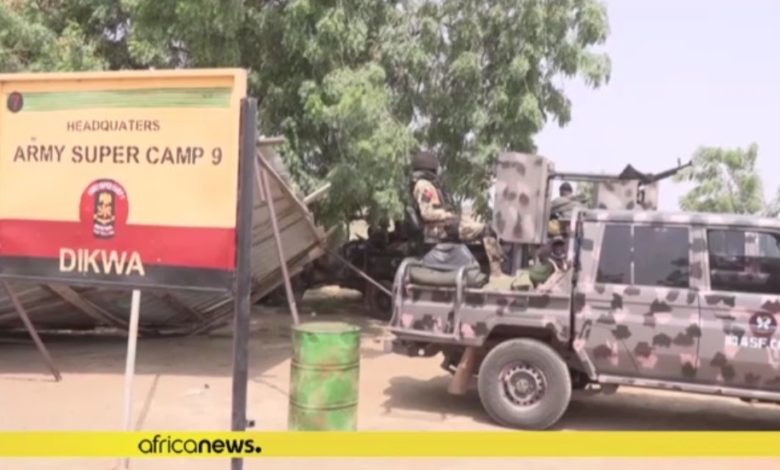Another Look At Nigeria’s Super Camp Strategy Two Years After
Nigeria's approach to counterinsurgency requires changes to extend state presences beyond green zones or garrison towns. While the policy has, to an extent, protected troops in the Northeast, it has also had unintended consequences on security in the region as it gives insurgents more leeway to attack and govern remote communities.

A series of attacks by insurgents on garrison towns and military super camps has cast a shadow on the governance and security model adopted in Northeastern Nigeria.
Over the past two years, there have been concerns about the security impact of the super camps. The camps were introduced in 2019 to stop the attrition of manpower and equipment caused by raids and overrunning of Forward Operating Bases (FOBs) by the Islamic State West Africa Province (ISWAP), a splinter faction of the Jama’atu Ahl al-Sunnah Lil-Dawa wal-Jihad (JAS) also known as Boko Haram.
“The ‘super camp’ strategy is apparently driven chiefly by the military’s inability to defend itself against constant ISWA(P) raids on poorly constructed military barracks in rural areas,” said Jacob Zenn, an adjunct assistant professor at Georgetown University, in a report for Council on Foreign Relations.
The strategy was also an extension of an earlier policy that involved the fortification of towns and moving local people from rural areas into camps for displaced persons located inside the garrison towns.
Although this idea was to remove civilians from areas of operations and leave behind the enemy combatants, it had unintended consequences on the humanitarian situation and fragility in the region.
What the super camps did
The super camps concentrated soldiers in bases located in garrison towns, from where troops are deployed for patrol and raids and to provide security along major routes.
In his report, Zenn said that while the military may have reduced the potential for casualties and theft of military material, it has also reduced its ability to combat ISWAP in rural areas.
HumAngle understands that the policy has, to an extent, protected troops in the super camps. However, an unintended consequence of the approach was the effect on security as it improved the insurgents’ ability to move freely, govern hinterland communities and manage resources.
A few kilometres from the last military outpost and trenches in garrison towns are usually unsafe for civilians to venture into for farming or collecting firewood.
Insurgents also mount checkpoints on roads and ambush vulnerable mobile units with insufficient Mine-Resistant Ambush-Protected vehicles and situational awareness.
Humanitarian operations were significantly affected by the high risks in hinterland communities and checkpoints by ISWAP, where several aid workers have been abducted.
Super camps and garrison towns are becoming targets
More recently, ISWAP has staged a series of audacious attacks on several garrison towns and super camps in Askira, Dikwa, Marte, Damasak, Geidam, and Mainok.
In April, the United Nations (UN) Resident and Humanitarian Coordinator announced the suspension of humanitarian operations in Dikwa and Damasak.
A shortfall of the super camps is that they are situated a few kilometres away from civilian settlements, making the rapid deployment of military response units difficult, as observed in recent attacks in Damasak and Geidam in Borno and Yobe states.
An additional constraint is the distance of Air Force bases, 103 Strike Group in Yola, Adamawa State, and 105 Composite Group, in Maiduguri in Borno State, from certain parts of the theatre of operations and garrison towns.
HumAngle has learnt that these kinds of attacks and incursion into strategic towns have led to a new wave of displacement and undermine public confidence in the ability of the military to protect residents. This is because of the perception that the priority for the military is base protection not the protection of the civilian population.
Recently, the Nigerian Army announced changes to the posture of the counterinsurgency towards a more joint operations environment, the re-designation of Army Super Camps to reflect the formations and units, and redesigning of sub-units as Forward Operating Bases (FOBs).
It’s unclear what the army intends as a follow-up to the re-designation of the about 21 military formations to reverse the current trajectory and improve presence in hinterland communities especially in Northern Borno, Yobe state and the Lake Chad area.
HumAngle understands that there is a need to expand governance and security presence beyond trenches of garrison towns or “green zones” to deny insurgents access to local population and resources needed to prolong the over-a-decade-long insurgency.
The ability of the military and government to reoccupy and stabilise hinterland communities will ease pressure on displaced persons’ camps, provide livelihood opportunities and improve the resilience of the people.
Troops that will be deployed in these areas will require enhanced base protection, situational awareness, protected mobility for night and day patrols, as well as routine logistic supply and rotation to improve effectiveness.
Experts say while the military needs to improve relations with locals. There is a need to integrate civilian intelligence apparatus for early warning and interventions alongside efforts by the government to re-establish civilian authority, provide social services and regain legitimacy.
The violence in Nigeria’s Northeast has led to over 37,500 deaths, displaced over 2.5 million people, and left about 8.7 million people in need of humanitarian assistance.
Support Our Journalism
There are millions of ordinary people affected by conflict in Africa whose stories are missing in the mainstream media. HumAngle is determined to tell those challenging and under-reported stories, hoping that the people impacted by these conflicts will find the safety and security they deserve.
To ensure that we continue to provide public service coverage, we have a small favour to ask you. We want you to be part of our journalistic endeavour by contributing a token to us.
Your donation will further promote a robust, free, and independent media.
Donate HereStay Closer To The Stories That Matter




